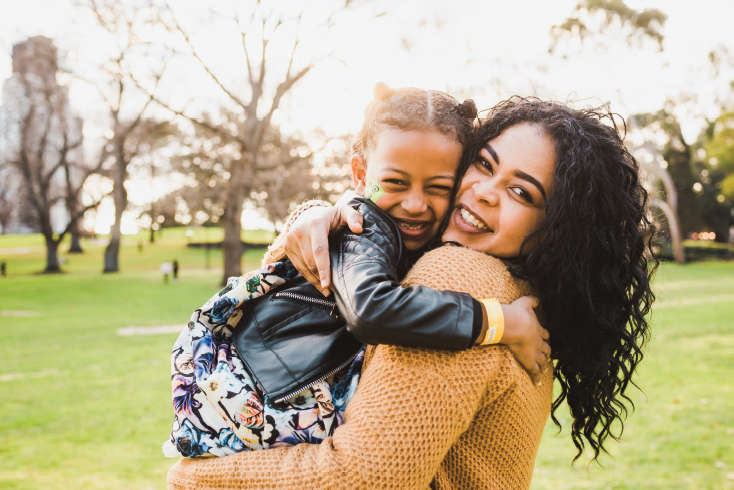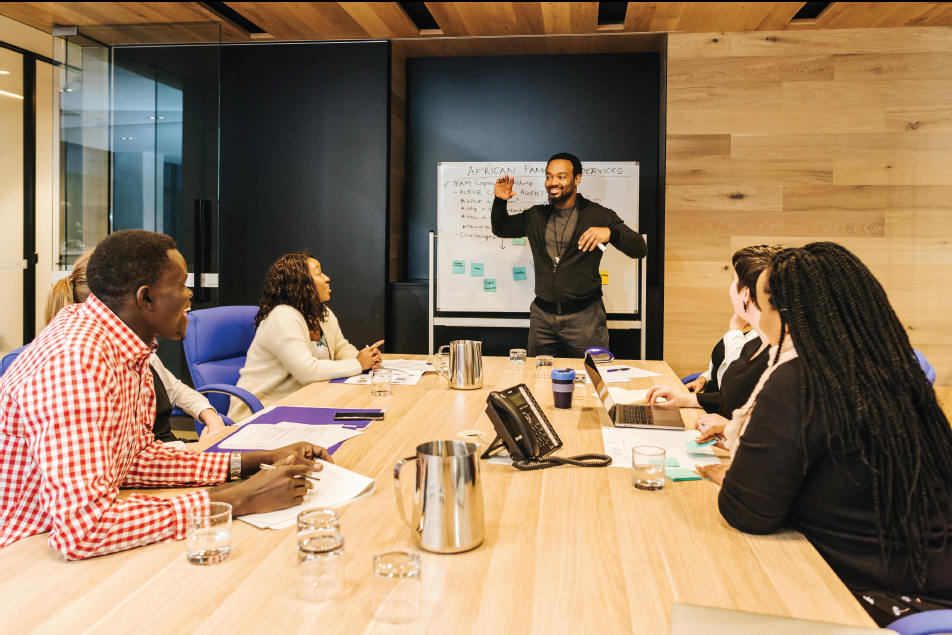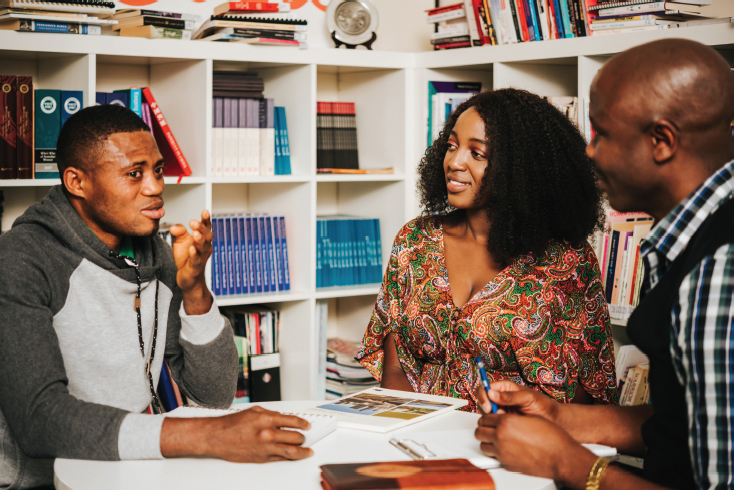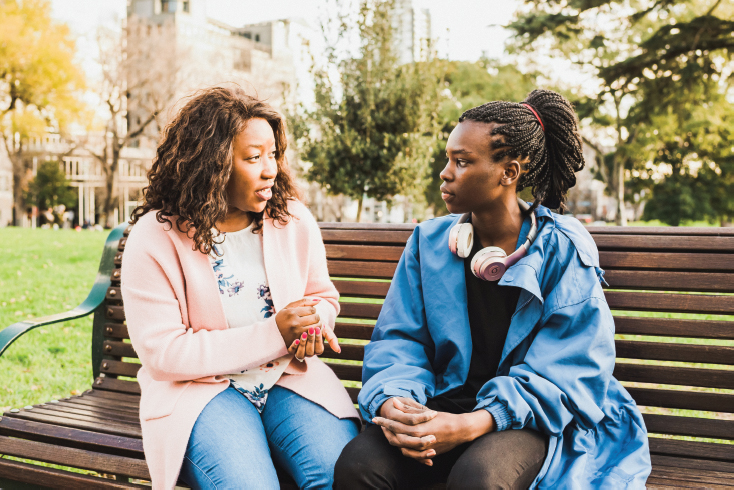5. African Family Services
Melvi Saji

About African Family Services
African Family Services (AFS) is a not-for-profit specialist organisation that was established in 2015, through the vision of two women, Kapambwe Mumba and Lorraine Baloyi. Despite Australia being a multicultural nation that constitutes people from over 190 different countries, many people from culturally diverse backgrounds experience certain challenges and barriers in accessing mainstream services. AFS was founded to address these socio-economic integration challenges, and serve African-Australian communities in Victoria, who were a new, emerging, and growing community at the time. When Loraine Baloyi and Kapambwe Mumba started the organization, they wanted to help other African Australians; now a key part of their work is specifically focused on family and domestic violence.
At AFS, we offer multiple services and programs state-wide for community members along with other organisations and service providers. AFS provides holistic and culturally responsive integrated support services in the areas of family violence, mental health, social inclusion, community and career development. Our services aim to empower people to address their challenges effectively, and access appropriate supports. AFS bridges the gap between the community and existing services, having developed an authentic understanding of the cultural complexities and needs that exist in African-Australian communities. There has been a rise in domestic violence with the pandemic. There are also mental health and suicide issues emerging in the community.
 Image 1 African Family Services © African Family Services.
Image 1 African Family Services © African Family Services.
This image is used with the permission of African Family Services and is not to be reproduced without permission. For more information, go to http://africanfamilyservices.org.au/.
Working from a strengths-based approach, we offer outreach and case management support. Research and our experience highlight that people from migrant communities are often unaware of the supports available. We provide access to information and resources to all our clients to enable them to make informed decisions and enhance their safety and wellbeing. Our case management support usually runs for a period of 6 months, during which we engage with individuals or families in a collaborative manner to meet their holistic needs. During the pandemic this has occurred remotely with most services delivered online.
We offer co-case management, which involves working with other services linked in with clients to ensure their needs are identified and met in a culturally responsive manner. We advocate to other services with and on behalf of clients as we place their rights and needs at the forefront. We also link individuals and families to appropriate services as required by providing information about these services, and making the required warm referrals. The pandemic has changed how this has occurs, but co-case management has continued to be provided.
 Image 2 African Family Services © African Family Services.
Image 2 African Family Services © African Family Services.
This image is used with the permission of African Family Services and is not to be reproduced without permission. For more information, go to http://africanfamilyservices.org.au/.
AFS provides cultural awareness training and secondary consultation for other service providers, organisations, government agencies and businesses. This is to enhance knowledge sharing, improve service delivery provision, and increase their ability to engage effectively with members from African-Australian communities. We run numerous on-line training programs, and culturally sensitive workshops, in which we work collaboratively with community members to empower them by developing and strengthening their skills, abilities and resources needed to adapt and thrive in Australia.
 Image 3 African Family Services © African Family Services.
Image 3 African Family Services © African Family Services.
This image is used with the permission of African Family Services and is not to be reproduced without permission. For more information, go to http://africanfamilyservices.org.au/.
Placement Background
AFS has had the pleasure of partnering with RMIT and hosting social work placements since 2019. Since July 2020, AFS has been offering field education placement to 10 RMIT students per year. Students are placed primarily with the Client Services team. AFS’s placement program aims to provide learning opportunities and adequate supports to help students build their professional identity and capability so that they can contribute to AFS’s work.
The Executive Director of Client Services provides fortnightly individual supervision to all students. AFS also hired a qualified social worker this year to help with the planning and organisation of placements and to work closely with the students on a daily basis. The social worker has helped with general tasking; and has provided a point of contact for students for daily debriefing.
In response to the challenges of Covid-19 lockdowns, we have created our remote placements to mirror – as far as possible – face-to-face student placement experiences. This has included allocating work phones and personalised AFS email addresses for students. Remote placements and remote work has assisted us as we move out of lockdowns because the agency has a small office and social distancing has been challenging. As the remote structures were set up the agency was able to continue its work as we were in and out of lockdowns. Remote work is challenging for clients who do not have phones, so it isn’t suitable or accessible for everyone.
In terms of the pandemic, we undertook some research and found that migrant communities who are often isolated, particularly if they don’t speak English, were further isolated during the pandemic. As the communities don’t have strong concepts of mental health and high levels of stigma, it has created more issues. For many, it was challenging not being able to go and visit ill relatives in Africa. Building trust, being of the same cultural background and getting to know someone is the key strategy to working with the community.
RMIT has been supportive with setting up student placements, providing a seamless process. GUSS WIL have been efficient and can be approached easily. RMIT staff have been extremely supportive in providing AFS with individual and organisational support while we provide ongoing student placement opportunities. We highly value our partnership with RMIT and look forward to its continuation.
 Image 4 African Family Services © African Family Services.
Image 4 African Family Services © African Family Services.
This image is used with the permission of African Family Services and is not to be reproduced without permission. For more information, go to http://africanfamilyservices.org.au/.
As a not-for-profit organisation with limited resources, AFS appreciates the valuable contribution made by placement students who form an integral part of our organisation when they are with us. In addition to their time and efforts, our students bring a unique lens and experience to the work they do. Their efforts are greatly appreciated by our clients. Past students have been dedicated, innovative, willing to learn, and have adapted well to the remote nature of placement which has been required during the pandemic. Students have also been able to contribute to a positive team environment and offer peer support, which is a valuable aspect of this placement. Subject to resource availability, short-term employment and volunteering opportunities have been offered to past students upon the completion of student placement. Some placement students have also secured employment at other multicultural organisations, specialist family violence services, and community development organisations as a result of the skills and experience developed at AFS.
Placement opportunities at AFS
Placement at AFS is a wonderful learning opportunity as it involves a combination of project work and direct practice. Students have been able to undertake client intake and assessment; and provide case management support. Through this, they have gained experience in case planning, attendance at care team meetings, and liaison with external services. Additionally, placement has enabled students to be involved in project work related to:
- community development in family violence and mental health,
- grant writing, and
- organisation-based research.
Through regular contact with experienced volunteers and AFS staff, they have gained skills in minute taking and facilitating meetings.
We have offered our placement students the opportunity to participate in fortnightly group supervision and reflective practice sessions. Group supervision sessions focus on enhancing the students’ knowledge on areas such as case noting, working with interpreters, family violence, and working with culturally diverse clients. During our reflective practice sessions, students take turns to facilitate a case presentation, critically reflect on what could be improved, and discuss the social work theories and skills used. This provides an opportunity for students to learn from the experiences of their colleagues. Past students have been offered both external and internal professional development training to further enhance their knowledge and skills set.
Some of the positive client outcomes achieved by students include:
- Enhanced emotional and social wellbeing
- Risk management and increased client safety through the completion of a comprehensive Family Violence Multi Agency Risk Assessment and Management Framework (MARAM) assessment and safety plan
- Access to Flexible Support Packages worth over $9500
- Better coordination of supports for client through the formation of a professional care team
- Improved financial stability by making referrals to various sources of financial supports including Red Cross Extreme Hardship Support Payment, Country Women’s Association, and Monash University Emergency Grant
- Increased access to food vouchers & parcels, baby items, furniture, and other material aid support from successful referrals to emergency relief services, St. Kilda Mums, Big Group Hugs, and the Queen’s fund
- Access to childcare, family day care, and school during Victoria’s lockdown as a result of case workers providing support letters to obtain exemptions, sourcing affordable family day cares, and applying for Additional Child Care Subsidy
- Successfully obtaining employment through registering for Jobs Victoria; assisting with resume writing, job application and interview preparation; and referrals to Fitted for Work and Job Advocate workers
- Utility bills assistance through advocacy which resulted in outstanding bill waivers, setting up of payment plans and successful Utility Relief Grant Scheme applications
- Referral to community and support groups to address lack of social connection and supports
Examples of students’ involvement in projects include:
- Planning and facilitation of a workshop on working with cultural diversity for all AFS staff, students, and volunteers
- Leading and conducting research into the impact of Covid-19 on family violence in Victoria’s African-Australian communities
- Involvement in the planning and co-facilitation of African Connect webinars
- Re-development of key internal proformas
- Re-development of AFS’ Privacy and Confidentiality Policy, Code of Conduct, and Induction Handbook
- Compiling a service map of key agencies in the area of family violence, mental health, alcohol and drugs, legal, financial support, and emergency relief
- Collaborating with senior staff to submit a grant application resulting in funding for a family violence prevention program
- Development of a family violence e-learning training program for community and faith-based leaders from African-Australian communities to enhance their knowledge and improve their ability to identify and respond to family violence in their community
Student Feedback
The following quotes are from students reflecting on their placements with us:
There are no two days alike on placement at AFS and so much to learn because there are endless opportunities to participate in project work, communities of practice meetings, grant writing, and to manage your own cases. [Placement student, Semester 2 2021]
Placement at AFS is like having a finger in every pie [Placement student,Semester 2 2020]
At first I was sceptical of working from home as I usually need a change of environment in order to stay focussed, but I found with the support from my supervisors and my fellow placement students it was quite easy to get into a good routine and there was always something valuable to be collaborating or working on [Placement student, Semester 2 2021]
My task supervisor has been really good with making sure everyone is heard and checked up on in the catch up and wrap up calls… the whole environment feels more welcoming when we’re able to get a sense of everyone’s personality and life [Placement student, Semester 1 2021]
AFS has given the students the opportunity to put our theories into practice and to reach out and support African communities in their times of need. [Placement student, Semester 2 2021]
AFS had excellent processes in place that supported my learning while undertaking placement remotely, such as daily briefings and debriefings, a team chat and regular check-ins. [Placement student, Semester 2 2021]
Innovations and Learnings
The challenges for AFS during the pandemic were immense but were able to be turned into opportunities for the future. Learning to work remotely was a great opportunity into the future as the organisation is now set up to deal with future similar situations and managing the social distancing requirements when returning to the office. Having students provided the opportunity to undertake further research, particularly in relation to Covid-19 and family violence. As an ethno-specific organisation, the agency has been able to respond to community challenges and stigma in a culturally sensitive manner.

